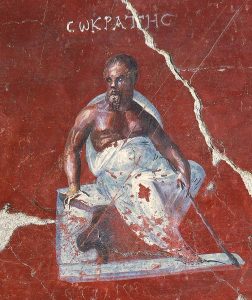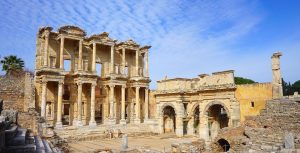Table of Contents
ToggleSt. Paul Ephesus and Journey
Missionary Journeys of St. Paul (Saint Paulus) in Ephesus
St. Paul, who has a very important place in the spread of Christianity, was born in the city of Tarsus, located in the Cilicia region of Anatolia, between 1-10 AD.
The name of Tarsus is mentioned as “Taşra” in Hittite texts for the first time. According to the Assyrians, it was the capital of the Que Kingdom. BC In the 8th and 7th centuries, the Assyrians named Tarsus – Tarzi (Tarzu). BC 6–5. Its name did not change during the Assyrian and Syennesis Kingdoms in the 16th century.
The name Tarsus is also found on the coins of the Persians minted in Tarsus. Tarsus was founded by Tarasis, the grandson of Noah, according to the Arab history called “Miratüliber”. The name Tarsus was first used as Tarsos in Greek and later as Tarsus in Latin.
The myth about the establishment of Tarsus province in Turkey is as follows: In ancient times, the indigenous Cilician people gave the name Kydnos to the Tarsus Stream, and Parthenia, the son of Kydnos, founded a city with his name on the place where Kydnos empties into the sea.
This city, which was founded with the withdrawal of the waters after the Flood, was named Tersein (drying). Tarsus is called Efsus in the Torah, Arsus in the Bible, and Hz. It is stated that it was founded by the son of Adam, the Prophet Šēt.
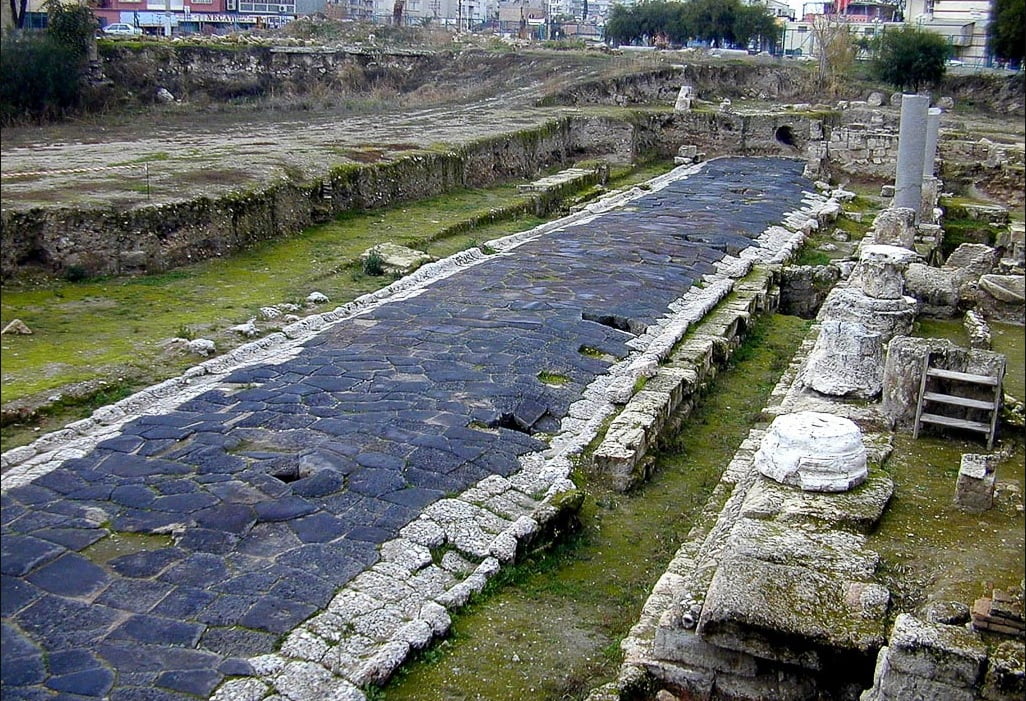
In Hebrew, the Hebrew word for Paul is Saul. At the time of the birth of St. Paul, the Jews living in the city of Helen could not become citizens. To become a citizen, it was necessary to give a great service to the city or make a great donation. Saul had inherited such a legacy from his father. Although he was Jewish, he was both a Jew and a Roman citizen.
Tarsus was one of the leading centers of culture, education, and philosophy in the Roman Empire at that time and had very good schools. He grew up in Jerusalem and was raised by Gamaliel, a leading authority of the Jewish Sanhedrin. In addition to learning the religious scriptures, he also studied Greek philosophers and met Stoic philosophers who advocated the virtuous acceptance of life as the path to happiness.
Saul’s main occupation was tent-making. He was a very good tent master and they had grown up in the trade. In his youth, Saul was a Pharisee. The Pharisees were a religious group that adhered to the written and oral traditions, as you will read in the Bible. He played an important role in the persecution of Christians.
He was dedicated to destroying Christians and Christianity. Among these was his involvement in the stoning of Stefan, an apostle of Jesus Christ and the first Christian martyr. Paul himself admits that he persecuted Christians before he became a Christian. Saul decided for Stephen to be stoned to death.
“Three days after the birth of Jesus Christ, the first Christian martyr St. Stephen is commemorated. He was the first official in the Christian Jerusalem municipality, which took care of widows and people in need. According to legends, the Virgin Mary and St. John the Theologian witnessed his death and prayed for him. Before taking his last breath, St. Stephen begged God to forgive his enemies.
The stoning of Stephen is notable not because he was the first Christian martyr, but because a man named Saul “consented to his death” (Acts 7:59), and his feet were “put by witnesses.” They took off their clothes” (Acts 7:57). over time, his death as a martyr was forgotten until his remains were found at the end of the 4th century.” It is here that Paul first appears as Saul. Acts 7: 58-60; 22:20. The most important reason why St. Paul was so critical of the new cult that followed Jesus Christ in the fact that Jesus died on the cross like a “criminal.” According to Paul, it could not be true that the Expected Messiah died on the cross.

The Acts of the Apostles or the works of the apostles or the works of the Apostles come after the Gospel of Luke in the Bible. The basic principle taken here is the spread and growth of Christianity from Jerusalem (Jerusalem) to Anatolia, from there to Greece, and from the Balkans to Rome. Thus, it bridges the gap between the letters of the Greek Scriptures and the Gospels.
Saint Paul's conversion to Christianity
How did Saul (Saint Paul) become a Christian?
Paul (Paul) was an influential figure in the early development of Christianity. His writings and letters form an important part of the Bible; Saint Paul pioneered in determining the direction of the emerging religion of Christianity. In particular, Paul stressed the role that salvation is based on faith, not on religious custom. On the way to Damascus, he transformed and became a Christian who devoted his life to preaching the gospel.
In the section on the apostles, he mentions that St. Paul played an active role in the massacres to suppress the first Christian movement and how he repented and became a Christian when he met the light of Jesus and spoke to him on his way to Damascus in 36 AD. He believed that he deserved to be considered an apostle because Jesus Christ appeared to him.
In 31-36 C.E., the Bible describes how St. Paul transformed from a persecutor of Christians to a devoted follower of Christ:
Jesus Appears to Saul
Saul, on the other hand, was still breathing threats and death against the Lord’s disciples. He went to the high priest and asked him to write letters to be given to the synagogues in Damascus.
There, the man and woman who were walking in the way of Jesus intended to arrest whoever he found and bring them to Jerusalem. As he was on his way and approaching Damascus, a light from the sky suddenly illuminated his surroundings. Falling to the ground, Saul said to himself, “Saul, Saul, why are you persecuting me?” he heard you say.
Saul said, “O Lord, who are you?” said.
“I am Jesus whom you persecute,” came the reply. “Get up and enter the city, and you will be told what to do.”
The men traveling with Saul were speechless and stood still. Although they heard the voice, they could not see anyone. Saul got up from the ground, but when he opened his eyes, he could see nothing. Then they took him by the hand and took him to Damascus. Saul, who was blind for three days, ate or drank nothing.
In Damascus, there was a disciple named Ananias. In a vision, the Lord said to him, “Ananias!” he called.
“I am here, Lord,” said Ananias.
Saint Paul and Christianity
The 3rd way of St. Paulus (53-57 AD):
After visiting the cities of Derbe (Asiran Village), Lystra (Hatunsaray Town), Iconium (Konya), Psidia Antiocheia (Yalvac), continuing from Antioch (Antakya) by road, first to Tarsus and then within the borders of the Kilikia Region, to Ephesus. (Selcuk) arrives. It passes from Ephesus to Troas (Canakkale). It continues to Macedonia by sea and stops by the Macedonian cities of Neapolis, Philippi, Amphipolis, Apollonia, Thessalonica, and Borea.
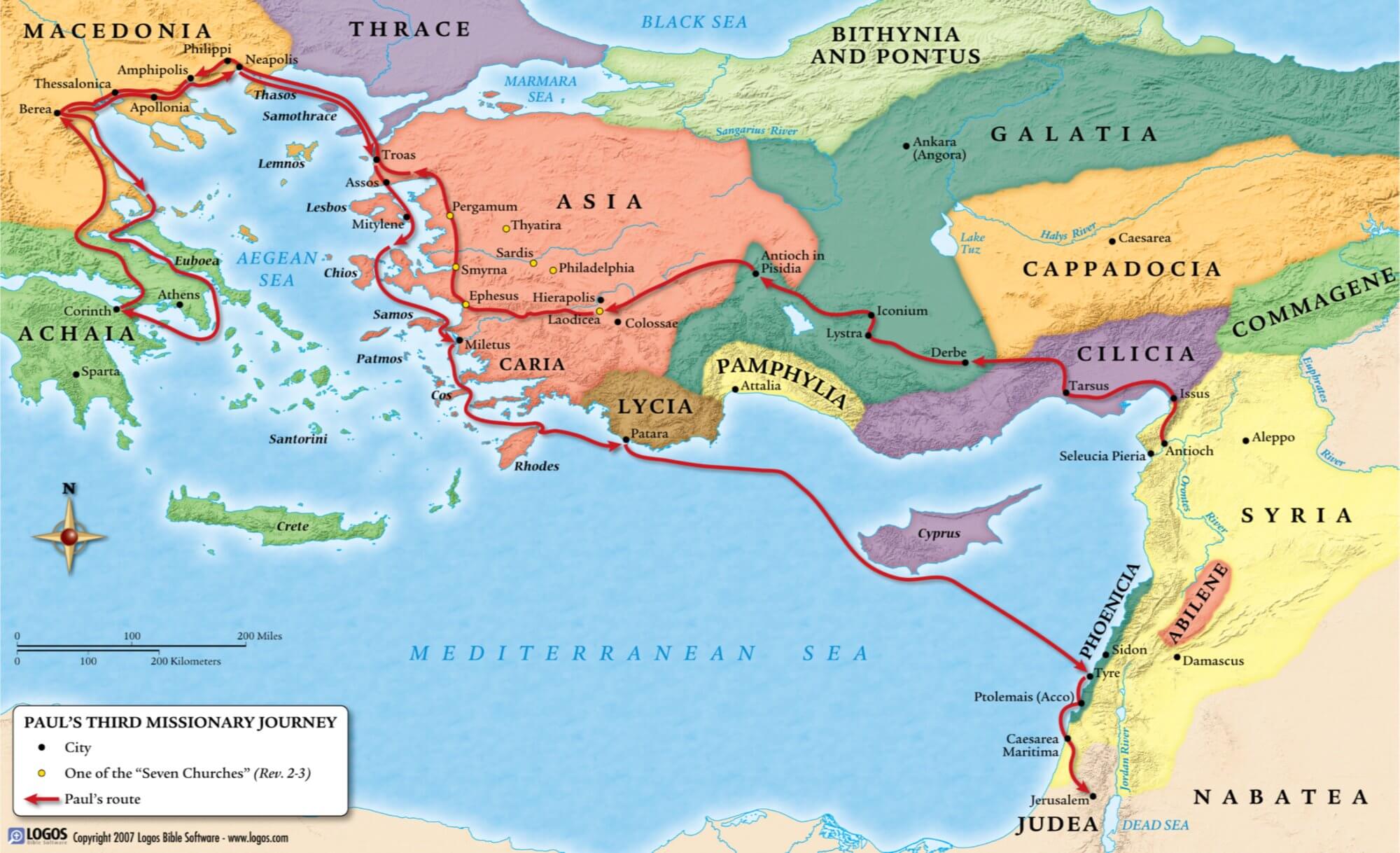
It then reaches Athens and Corinth in continental Greece by road. Returning from Corinth, it follows the same route again and reaches Troas (Canakkale). Cos (Kos) Island and Rhodes (Rhodes) Island will be the next stop of the visit to Assos (Behramkale), its islands in the Aegean Sea, and Miletus (Balat). It passes from Rhodes (Rhodes) to Anatolia and reaches Patara (Kalkan). Continuing his journey by sea again, Tire in Phonecia comes to Caesarias and Jerusalem (Jerusalem) via the cities of Ptolemais and completes his journey.
Saint Paul is in Ephesus
St. Paul first visited Ephesus on his second trip. St. Paul, who went to the synagogues here and gave speeches on various subjects, answered the requests of the Ephesians to stay longer, as “I will come back to you again if God wills” and after a while, he will stay in Ephesus, where he came once again on his third journey. When he came to Ephesus, the first thing he did was baptize the Christians there.
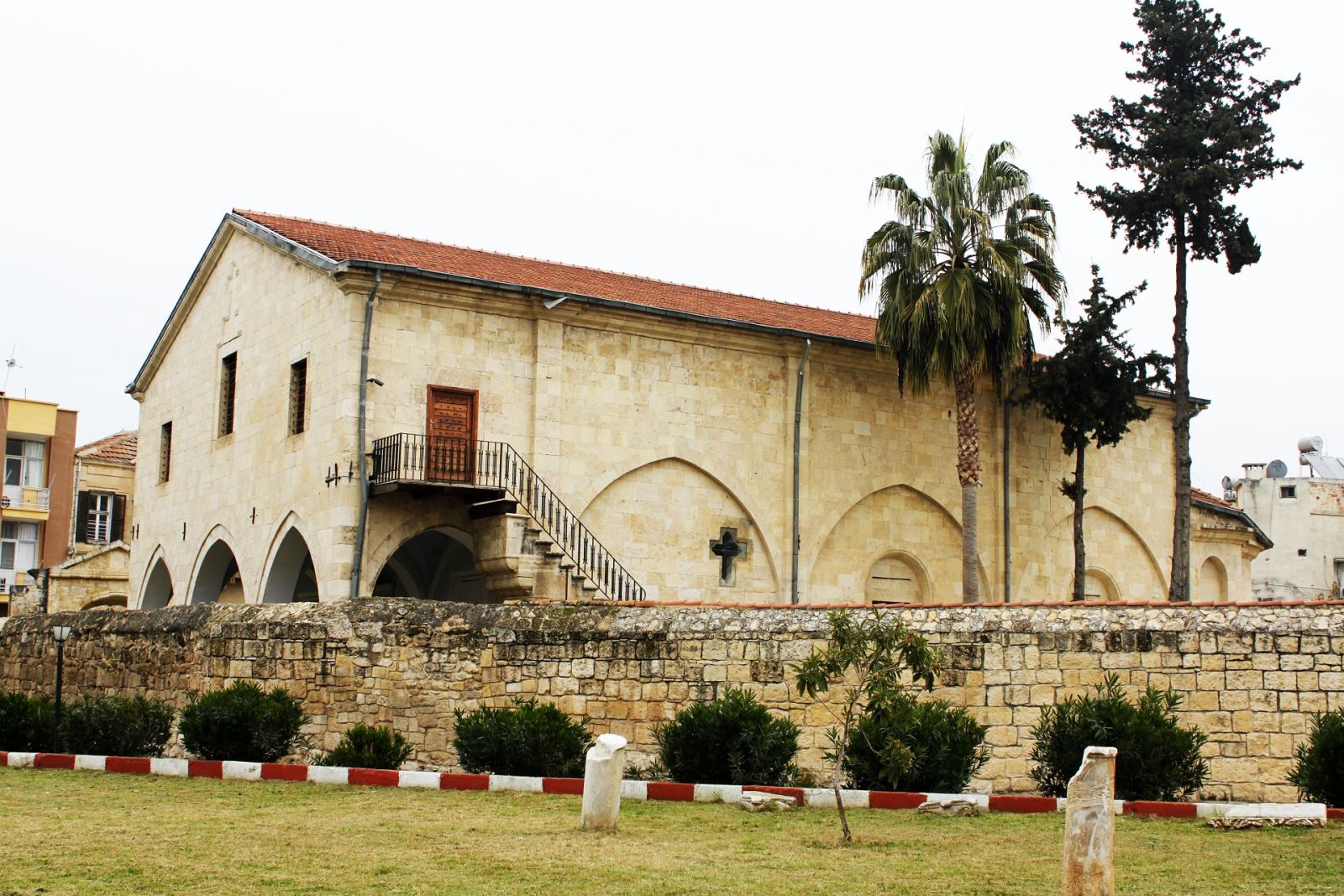
Afterward, He tried to spread the teachings of Jesus in the synagogues, had various debates, did not get tired of the attitudes and hostilities, and vilifications against him, and with the speeches, he made over the years, everyone regardless of religion and nationality. He made her hear the words of Jesus. He did not hesitate to make speeches even by walking from house to house, as he gave his sermons in open areas and synagogues.
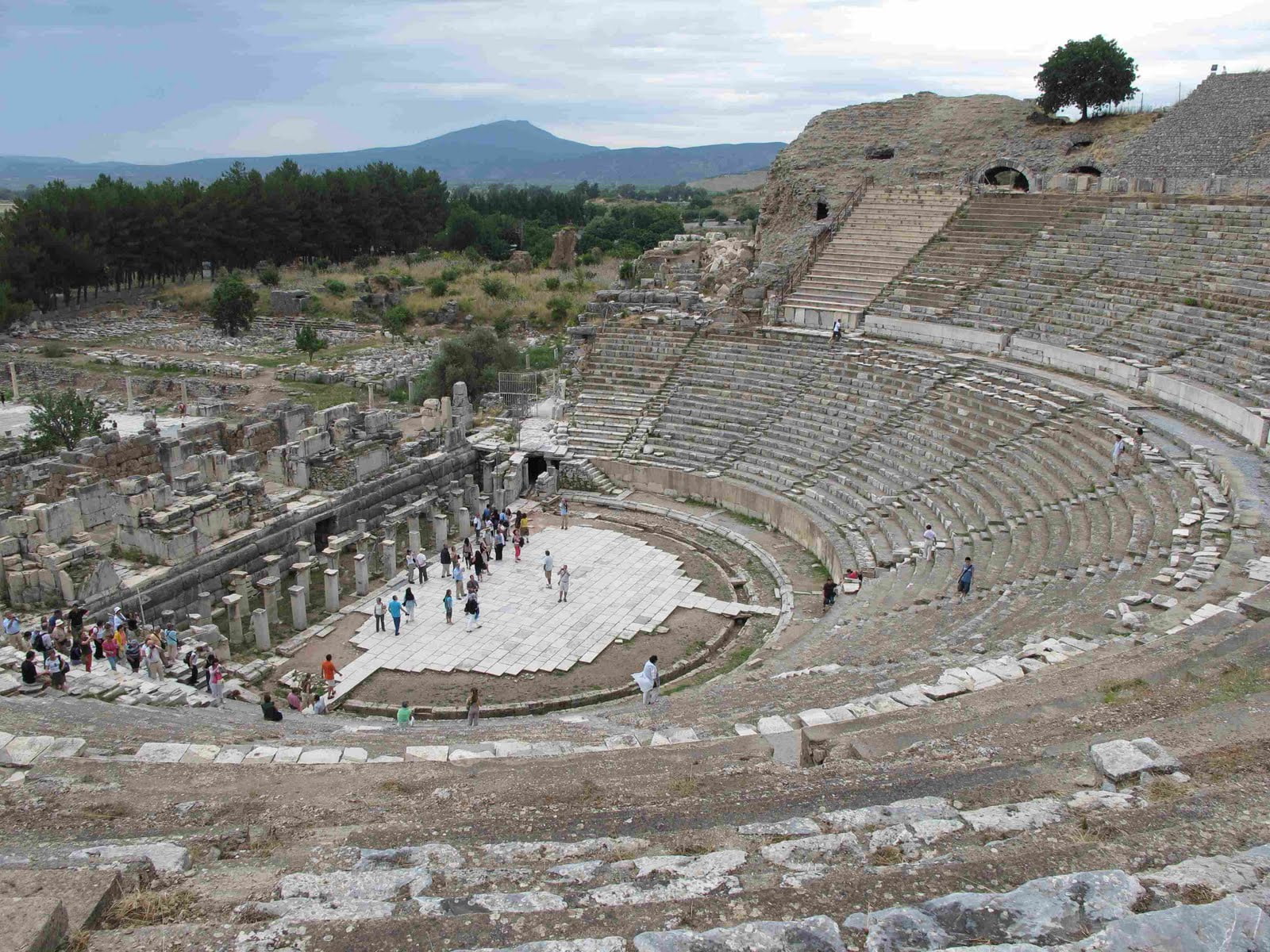
Meanwhile, he performed many miracles. Handkerchiefs and clothes that touched the body of St. Paul were taken to those who were sick and those who had evil spirits in them, it was seen that they healed quickly.
These miracles He made the name of Jesus and St. Paul commemorated with greater respect.
In the face of all these miracles, the people, who were worried about the rapid spread of Christianity and the disregard of the temple of Artemis, the god of Ephesus, dragged some of St. After this environment of turmoil, St. Paul goes to Macedonia to bring new followers to Christianity.
After he came to Miletus from Macedonia, he sent word to the Ephesians, summoned the elders of the community to him, and told them how he served the Lord with humility, despite the exclusions and the hardships he endured, and what he had endured spreading his words, but now he had to go to Jerusalem.
St. Paul spent the years 51-54 A.D. in Ephesus and wrote the letters in the Bible that conveyed God’s commands to Ephesians and different nations such as Galatia.
St. Paul and The Silversmith Riots
I don’t believe in the stories of the Bible, but neither do I have proof that they never happened so adopting a neutral point of view, I envisioned in my mind a tale from the Acts of the Apostles (19:23-41.) If you emerge yourself in the scene depicted in this story, it provokes a vivid image of how thousands of people would gather in the theatre and prompt each other into states of euphoria from the gladiator or animal fights, minds of clever thinking from the political discussions or in Saint Paul’s case, pure hard-core anger.
The story starts by telling us about a silversmith called Demetrius. He used to sell statues of the goddess Diana (Artemis), from the nearby structure of the Temple of Artemis (one of the Seven Wonders of the Ancient World.)
However, Paul said…“Gods made by human hands are not gods at all.”
This enraged Demetrius since it was a threat to his livelihood. He told the growing crowds on the harbor street… “There is danger not only that our trade will lose its good name, but also that the temple of the great goddess Artemis will be discredited”
The people started shouting “Great is Artemis of the Ephesians!” and gathered en-mass in the theatre, demanding Paul show his face, but his disciples, fearing for his life advised him to stay away.
The city clerk calmed the crowds down by saying…“Fellow Ephesians, doesn’t all the world know that the city of Ephesus is the guardian of the temple of the great Artemis and of her image, which fell from heaven?”
Shortly after that, Paul left Ephesus because of fears for his safety although some claim he was imprisoned there. When you visit Ephesus theatre, imagine that story, whether you are religious or not. I guarantee that instead of feeling like you are looking at a pile of ancient stones, you will instead realize the social and political importance of what was the heart and soul of Ephesus, one of the greatest cities of human history.
St. Paul in Ephesus
19 While Apollos was at Corinth, Paul took the road through the interior and arrived at Ephesus. There he found some disciples
2 and asked them, “Did you receive the Holy Spirit when you believed?”
They answered, “No, we have not even heard that there is a Holy Spirit.”
3 So Paul asked, “Then what baptism did you receive?”
“John’s baptism,” they replied.

4 Paul said, “John’s baptism was a baptism of repentance. He told the people to believe in the one coming after him, that is, in Jesus.”
5 On hearing this, they were baptized in the name of the Lord Jesus.
6 When Paul placed his hands on them, the Holy Spirit came on them, and they spoke in tongues and prophesied.
7 There were about twelve men in all.
8 Paul entered the synagogue and spoke boldly there for three months, arguing persuasively about the kingdom of God.
9 But some of them became obstinate; they refused to believe and publicly maligned the Way. So Paul left them. He took the disciples with him and had discussions daily in the lecture hall of Tyrannus.
10 This went on for two years so that all the Jews and Greeks who lived in the province of Asia heard the word of the Lord.
11 God did extraordinary miracles through Paul,
12 so that even handkerchiefs and aprons that had touched him were taken to the sick, and their illnesses were cured and the evil spirits left them.
13 Some Jews who went around driving out evil spirits tried to invoke the name of the Lord Jesus over those who were demon-possessed. They would say, “In the name of the Jesus whom Paul preaches, I command you to come out.”
14 Seven sons of Sceva, a Jewish chief priest, were doing this.
15 One day the evil spirit answered them, “Jesus I know, and Paul I know about, but who are you?”
16 Then the man who had the evil spirit jumped on them and overpowered them all. He gave them such a beating that they ran out of the house naked and bleeding.
17 When this became known to the Jews and Greeks living in Ephesus, they were all seized with fear, and the name of the Lord Jesus was held in high honor.
18 Many of those who believed now came and openly confessed what they had done.
19 A number who had practiced sorcery brought their scrolls together and burned them publicly. When they calculated the value of the scrolls, the total came to fifty thousand drachmas.
20 In this way the word of the Lord spread widely and grew in power.
21 After all this had happened, Paul decided to go to Jerusalem, passing through Macedonia and Achaia. “After I have been there,” he said, “I must visit Rome also.”
22 He sent two of his helpers, Timothy and Erastus, to Macedonia, while he stayed in the province of Asia a little longer.
The Riot in Ephesus
23 About that time there arose a great disturbance about the Way.
24 A silversmith named Demetrius, who made silver shrines of Artemis, brought in a lot of business for the craftsmen there.
25 He called them together, along with the workers in related trades, and said: “You know, my friends, that we receive a good income from this business.
26 And you see and hear how this fellow Paul has convinced and led astray large numbers of people here in Ephesus and in practically the whole province of Asia. He says that gods made by human hands are no gods at all.
27 There is danger not only that our trade will lose its good name, but also that the temple of the great goddess Artemis will be discredited; and the goddess herself, who is worshiped throughout the province of Asia and the world, will be robbed of her divine majesty.”
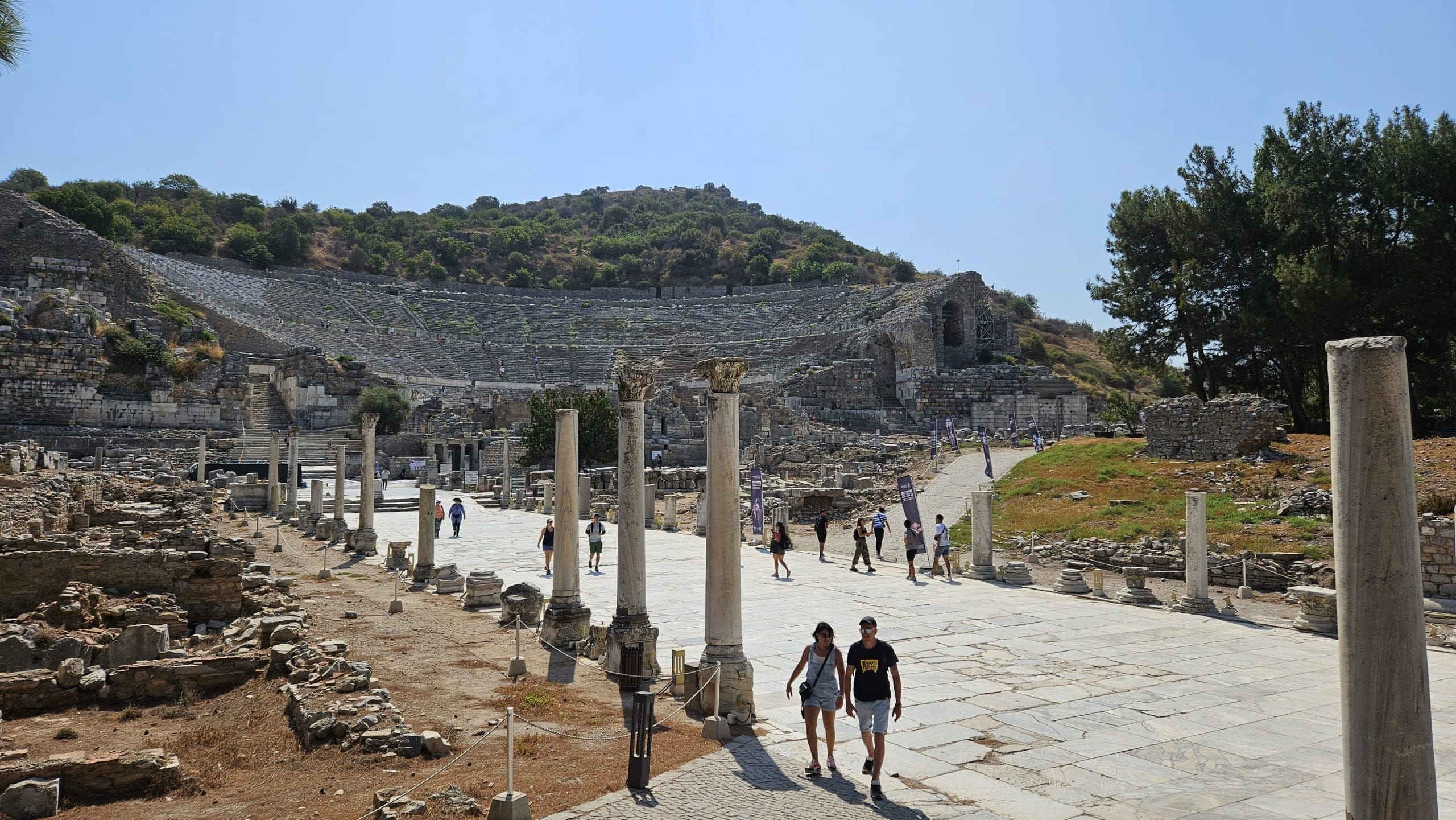
28 When they heard this, they were furious and began shouting: “Great is Artemis of the Ephesians!”
29 Soon the whole city was in an uproar. The people seized Gaius and Aristarchus, Paul’s traveling companions from Macedonia, and all of them rushed into the theater together.
30 Paul wanted to appear before the crowd, but the disciples would not let him.
31 Even some of the officials of the province, friends of Paul, sent him a message begging him not to venture into the theater.
32 The assembly was in confusion: Some were shouting one thing, some another. Most of the people did not even know why they were there.
33 The Jews in the crowd pushed Alexander to the front, and they shouted instructions to him. He motioned for silence to make a defense before the people.
34 But when they realized he was a Jew, they all shouted in unison for about two hours: “Great is Artemis of the Ephesians!”
35 The city clerk quieted the crowd and said: “Fellow Ephesians, doesn’t all the world know that the city of Ephesus is the guardian of the temple of the great Artemis and of her image, which fell from heaven?
36 Therefore, since these facts are undeniable, you ought to calm down and not do anything rash.
37 You have brought these men here, though they have neither robbed temples nor blasphemed our goddess.
38 If, then, Demetrius and his fellow craftsmen have a grievance against anybody, the courts are open and there are proconsuls. They can press charges.
39 If there is anything further you want to bring up, it must be settled in a legal assembly.
40 As it is, we are in danger of being charged with rioting because of what happened today. In that case, we would not be able to account for this commotion, since there is no reason for it.”
41 After he had said this, he dismissed the assembly.
St. Paul’s cave is located above the terrace houses in the ancient city of Ephesus.
St. Paul's cave in Ephesus.
Footnotes
Acts 19:2 Or after
Acts 19:6 Or other languages
Acts 19:19 A drachma was a silver coin worth about a day’s wages.
Acts 19:21 Or decided in the Spirit
Ephesians contains:
1:1,2. The greeting, from Paul to the church of Ephesus.
1:3–2:10. A general account of the blessings that the gospel reveals. This includes the source of these blessings, how they are attained, the reason why they are given, and their final result. The whole of the section Ephesians
1:3–23 consists in the original Greek of just two lengthy and complex sentences.
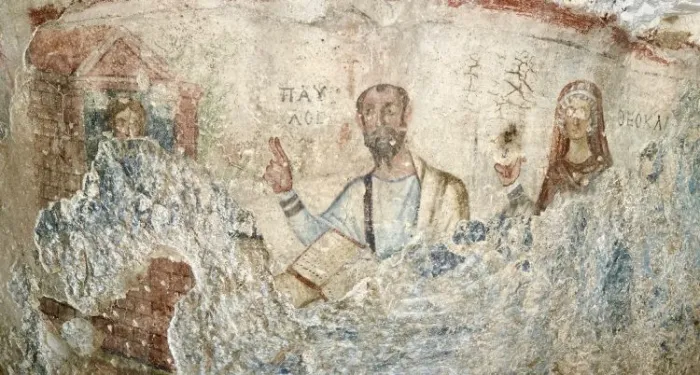
It ends with a fervent prayer for the further spiritual enrichment of the Ephesians.
Ephesians 2:11-3:21 A description of the change in the spiritual position of Gentiles as a result of the work of Christ.
It ends with an account of how Paul was selected and qualified to be an apostle to the Gentiles, in the hope that this will keep them from being dispirited and lead him to pray for them.
Ephesians 4:1-16. A chapter on unity amid the diversity of gifts among believers.
Ephesians 4:17-6:9. Instructions about ordinary life and different relationships.
Ephesians 6:10-24. The imagery of spiritual warfare (including the metaphor of the Armor of God), the mission of Tychicus, and valedictory blessings.
Founding of the church at Ephesus
Paul’s first and hurried visit for the space of three months to Ephesus is recorded in Acts 18:19–21. The work he began on this occasion was carried forward by Apollos and Aquila and Priscilla. On his second visit early in the following year, he remained at Ephesus for “three years”, for he found it was the key to the western provinces of Asia Minor.
Here “a great door and effectual” was opened to him, and the church was established and strengthened by his diligent labors there. From Ephesus, the gospel spread abroad “almost throughout all Asia.” The word “mightily grew and prevailed” despite all the opposition and persecution he encountered.
On his last journey to Jerusalem, the apostle landed at Miletus and, summoning together the elders of the church from Ephesus, delivered to them a farewell charge, expecting to see them no more.
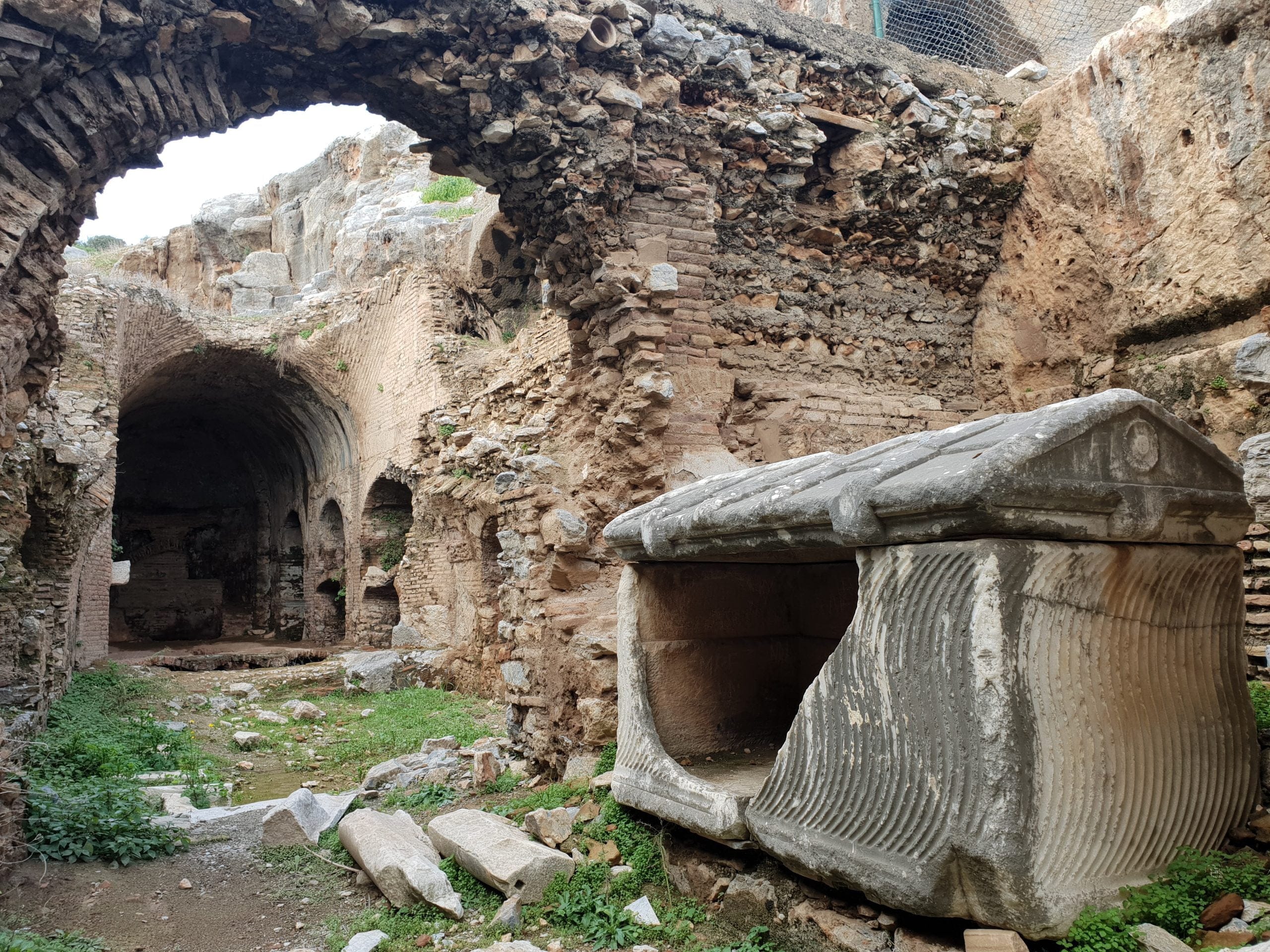
The following parallels between this epistle and the Milesian charge may be traced:
Acts 20:19 = Ephesians 4:2. The phrase “lowliness of mind”.
Acts 20:27 = Ephesians 1:11.The word “counsel”, denotes the divine plan.
Acts 20:32 = Ephesians 3:20. The divine ability.
Acts 20:32 = Ephesians 2:20 The building upon the foundation.
Acts 20:32 = Ephesians 1:14,18 “The inheritance of the saints.”
Ephesus is one of the most important cities in terms of Christianity. The church, which is shown as the most important of the seven churches in the Bible, is also located in Ephesus. Ephesus was the place where the third universal council meeting was held in 431.
Ephesus is the place where the evangelist John, who is the author of one of the four holy Gospels and gave his name to the church of St. John, who founded the first seven churches in Turkey, also lived in Ephesus. Another cave where the Legend of the Seven Sleepers, a common belief in Anatolia, is believed to have passed, is here.


